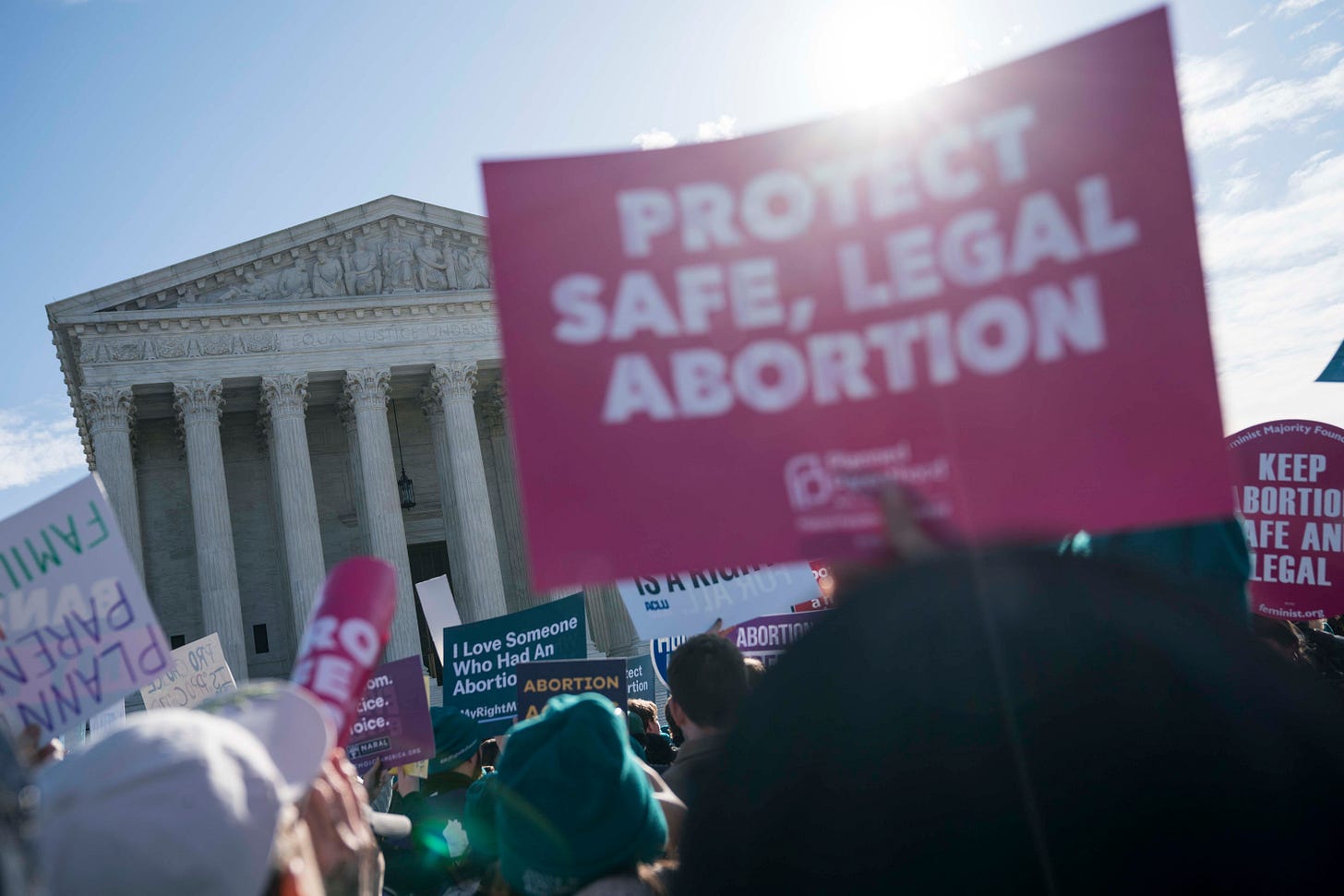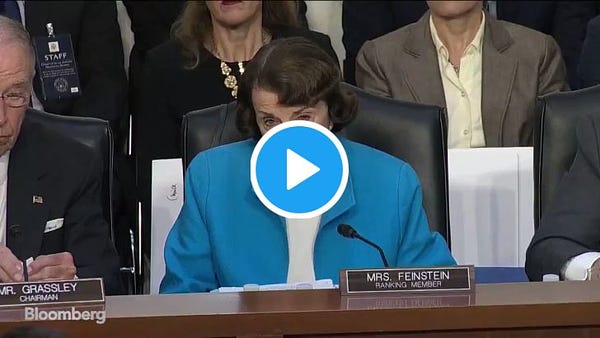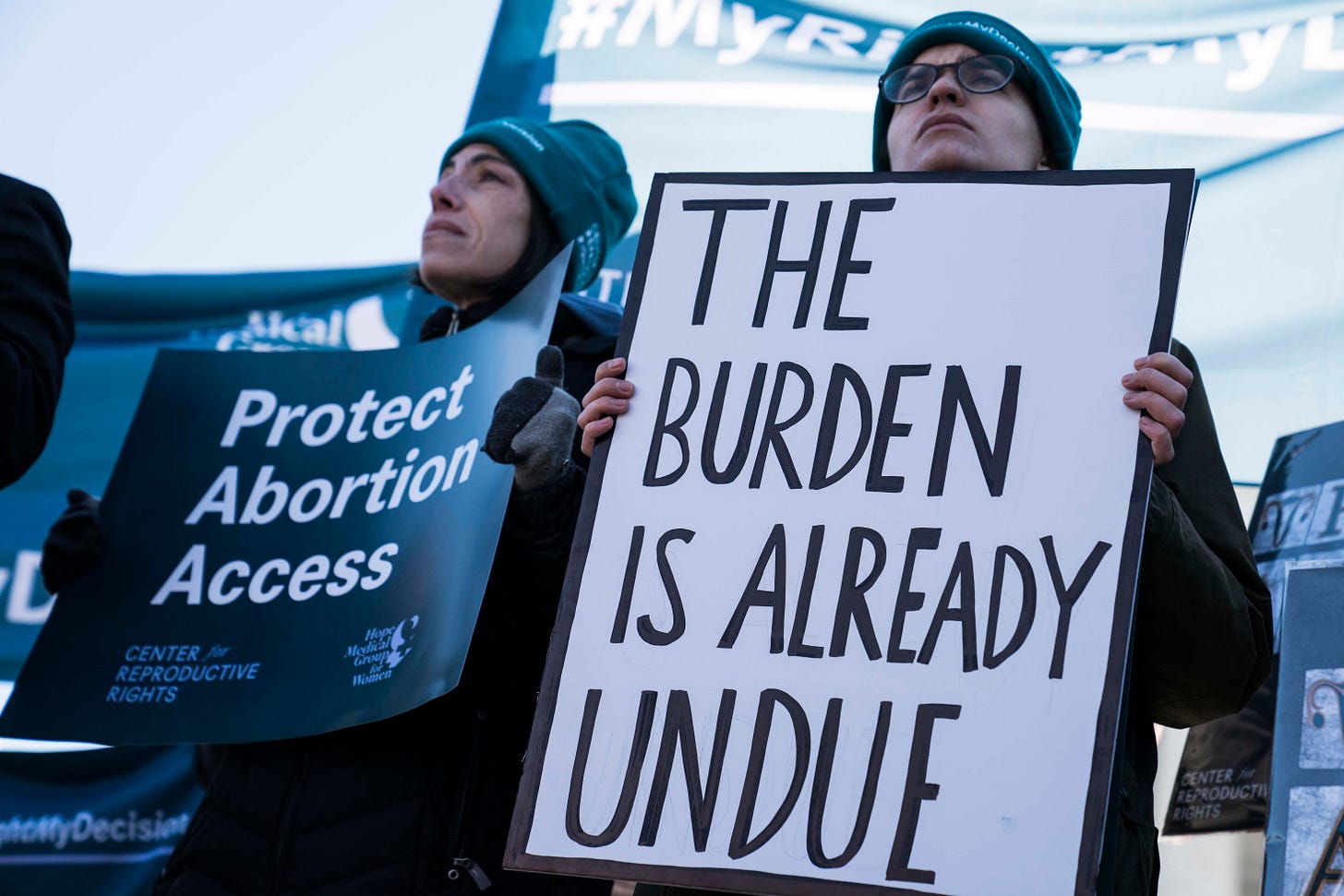Kavanaugh and Gorsuch Earn Their Keep
In a landmark case that establishes where Trump's nominees will side, the Supreme Court strikes down a Louisiana law that limits access to abortion by a decision of 5-4.
Chief Justice John Roberts just saved the day by joining the Supreme Court’s other more liberal justices to strike down abortion limitations in Louisiana. In a 5-4 decision yesterday, the Supreme Court found that Louisiana's recent state law that required any doctor offering abortion services to have admitting privileges at a hospital within 30 miles, violates the Constitution.

(People participate in an abortion rights rally outside of the Supreme Court as the justices hear oral arguments in the June Medical Services v. Russo case on March 4, 2020 in Washington, DC. Photo by Sarah Silbiger, via Getty Images.)
This latest decision was a litmus test for where the newer, more conservative justices would land, and while their opinions were predictably disappointing, the outcome is nonetheless a narrow victory for abortion rights advocates.
The law in question was passed by the Louisiana Legislature in 2014 and the subsequent legal battle has ensued for years. Two Louisiana doctors and a medical clinic sued to get the law overturned, claiming the law was an undue burden for women attempting to access a legal abortion because, if enacted, the law would leave only one doctor at a single clinic to provide services for nearly 10,000 women who seek abortions in the state each year.
Challengers to the strict regulation also argued that the requirement was identical to a Texas law the Supreme Court struck down in 2016. In Whole Woman's Health v. Hellerstedt, the court ruled that Texas had imposed an obstacle on women seeking access to abortion services without providing any medical benefits.
This case established a precedent that should have made yesterday’s decision seem like a slam-dunk for Reproductive Rights advocates. However, a deciding factor in that case was Justice Kennedy who joined the majority as the swing-vote — Kennedy has since retired and he was succeeded by the more controversial and conservative Justice Brett Kavanaugh.
Kavanaugh was appointed by Trump amid heavy controversy and his position on Roe v. Wade was often in question during his confirmation hearings. Many have speculated as to how Kavanaugh might rule in a case like this where previous precedent would require him to go against his personal beliefs. We no longer need to wonder as he was among the four dissenters on Monday who refused to follow the precedent set in 2016 after swearing under oath several times during his confirmation hearing that he would not disturb settled law. (See video in tweet below.)


Justice Stephen Breyer, who also wrote the majority opinion for the 2016 Texas decision, wrote Monday's opinion as well. Breyer explained that the law imposed by the state of Louisiana created a substantial obstacle to women seeking abortions and offers no significant health benefits "and therefore imposes an undue burden on a woman's constitutional right to choose to have an abortion."
Breyer went on to point out that hospitalizations after abortion procedures were rare, and that women would receive medical care at hospitals whether their doctors had admitting privileges or not. Furthermore, he said, abortion providers were often unable to obtain admitting privileges for reasons unrelated to their competence.
Justice Roberts, who served as the Kennedy-esque swing vote in this case, said that while he believed the court was wrong to strike down the Texas law in 2016, he was bound by the precedent established by that decision and voted with the majority for that very reason. According to Roberts, "The Louisiana law imposes a burden on access to abortion just as severe as that imposed by the Texas law, for the same reasons. Therefore Louisiana's law cannot stand under our precedents."
The four dissenting Justices wrote that the challengers in this case were not legally entitled to bring the lawsuit, because “abortion rights belongs to women, not to doctors and clinics.” Take a moment to pause for the irony of that argument.
Justice Thomas went on to say, "Our abortion precedents are grievously wrong and should be overruled.” Justice Samuel Alito said of both Monday's ruling and the previous decision striking down the Texas law that "the abortion right is used like a bulldozer to flatten legal rules that stand in the way." Justice Neil Gorsuch said the court should have given more deference to Louisiana's reasons for enacting the law. Justice Kavanaugh said he would have sent the case back to gather more information on its potential effects on access to abortion services.

(Pro-choice abortion activists protest during a demonstration outside the Supreme Court in Washington on March 4, 2020, as the Court hears oral arguments regarding a Louisiana law about abortion access. Photo by Caroline Brehman, via Getty Images.)
House Speaker Nancy Pelosi (D-CA) issued a statement that accused Republicans of waging a national assault on Roe v. Wade that they intend to fight on a state by state basis. She went on to say, "Louisiana's draconian abortion ban was a clear and intentional violation of the Constitution, explicitly designed to permanently destroy women's reproductive freedoms and dismantle their right to make their own decisions about their health, bodies and timing and size of their families."
The White House responded to the ruling by claiming that states have a right to regulate medical procedures in order to “protect patient safety," despite valid arguments that the effect of restricting access to safe abortions does just the opposite. White House Press Secretary, Kayleigh McEnany, called the decision "an unfortunate ruling” that “devalue[s] both the health of mothers and the lives of unborn children.” It’s difficult to take a statement like this seriously from the same administration who has separated migrant mothers from their children and even caused the deaths of some of those children while in their custody.

The bottom line is that yesterday’s victory at the Supreme Court could be short lived should a direct challenge to Roe v. Wade reach the court, as we still don’t know precisely where Chief Justice Roberts might fall in his opinion to determine new law with regard to other abortion restrictions. We also should not overlook that the women of Louisiana have suffered as pawns in the back and forth battle that has taken years to ultimately decide. With Kavanaugh and Gorsuch showing their true colors one thing is clear — this struggle for reproductive rights is far from over. We were just lucky to win this one this time.
Amee Vanderpool writes the “Shero” Newsletter and is an attorney, published author, contributor to magazines and newspapers and analyst for BBC radio. She can be reached at avanderpool@gmail.com or follow her on Twitter @girlsreallyrule.
Posts like this are made possible by paid subscriptions from readers like you, which allow me to keep writing critical news for the public like this. By getting a paid subscription to SHERO, you will be getting exclusive content not available to everyone while supporting independent journalism for everyone. Please consider getting your paid subscription today.




Paging Senator Susan Collins: The man for whom you voted "yes" (Brett Kavanaugh) just did exactly what you said he would never do.
I hope that Maine voters toss her out of office in November.
Can Kavanaugh be Impeached for lying ? Nicely put together Amee thank you